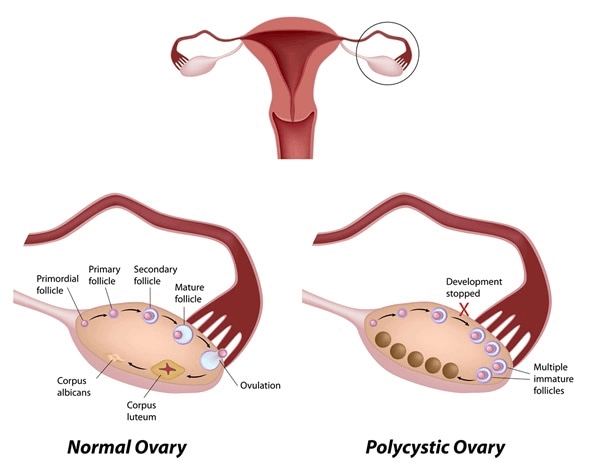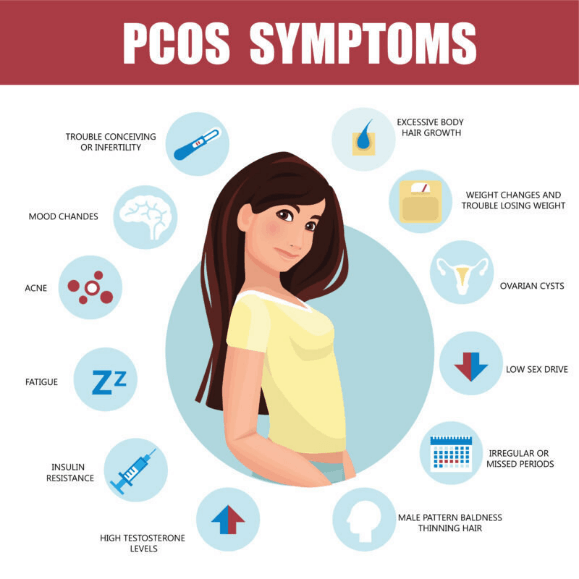PCOD - Polycystic Ovarian DiseaseLifestyle changes and wrong eating habits are causes of many diseases. However, such conditions are treatable and can be improved through proper measures. One such health condition commonly seen in the teens and young women is polycystic ovarian disease or PCOD. It causes an imbalance in the production of hormones which may lead to prolonged health conditions. Every one out of ten women has PCOD due to varied reasons. Although it is a disease that has symptoms that affect your mental and physical health, it can be overcome with the right dietary habits and medications. What is Polycystic Ovarian Disease?Polycystic ovarian disease (PCOD) is also known as a polycystic ovarian syndrome (PCOS). PCOD is a disease caused due to hormonal imbalance in women, commonly in reproductive age. The five reproductive hormones play a vital role in the reproductive system of women. Imbalance in any of these hormones causes a hormonal disorder known as PCOS/PCOD. In PCOS, the imbalance in the hormones leads to increase in the production of male hormone. This increased amount of male hormones causes irregular periods, facial hair growth, and problems in conceiving. Many options of treatment of PCOS are available, which include medications. These treatments ensure reducing the effect of symptoms of PCOS on the body. 
Initial Signs of PCODThe signs of PCOD help women to realize that their body is experiencing changes and needs treatment. PCOD causes a complete imbalance of the hormones that leads to many changes in the body. Eventually, it may breakdown the reproductive system of patient. It causes the abnormal release of hormones, which causes an imbalance in the system. Consequently, an abnormal amount of male hormone is released by the ovaries. This excessive release of male hormone leads to abnormal hair growth on the face and body, hair loss, irregular menstrual cycle, and acne. Moreover, it also hinders the ovulation process. Although these are the signs of PCOD, these do not always indicate that women have PCOD. Hence proper diagnoses must be done before proceeding with the treatment of the disease. Causes of PCODThere are several causes of PCOS, but these are not specific. These range from lifestyle-related to genetic causes. PCOD is simply the imbalance of hormones in women. It is caused due to -
The treatment for PCOD is done considering these causes. However, it is crucial to find out the exact cause for each patient to start appropriate treatment. Symptoms of PCODSymptoms are crucial initial alarms that make us aware of any health condition or abnormality in our body. These initial alarms differ for different diseases. PCOD is detected through the common symptoms mentioned below -
All these symptoms are generally due to hormonal imbalance. However, these do not necessarily mean PCOD. Hence proper diagnosis is a must before starting treatment. After noticing one or more symptoms, women must get the diagnosis done from a practitioner and proceed for treatment. 
Identification of the Common SymptomsPCOS can affect women of any age. However, most women experience PCOS during their late teens or early twenties. The effect of the symptoms is different for each patient. It affects everyone differently. The symptoms that could be identified easily are -
Misdiagnosis is common among women having symptoms similar to that of PCOS. Although the symptoms can be easily identified, they may not always mean PCOD. After the identification of symptoms of PCOS, one must consult their doctor and get the diagnosis done. The diagnosis must be done completely so as to avoid misdiagnosis of the symptoms. Treatment of PCODPolycystic ovarian syndrome can be treated by managing diet and maintaining a healthy weight. Some of the treatments include medications for -
PCOS difficult to be completely cured; however, the effects can be controlled which may reduce the risk of other health complications. To control PCOS symptoms, the doctor may prescribe medications and dietary habits that may help the patient recover faster. Medicines such as clomiphene are recommended for ovulation to resume. Similarly, a doctor prescribes different medicines for different symptoms such as hair growth, etc. The treatment for PCOS is very personalized as it has wide symptoms. Many different treatment methods are available to ease the symptoms. These include naturopathy. The treatment options must be chosen carefully according to the symptoms. It may help in lowering the impact of symptoms. Many women take the medications for symptoms without getting the diagnosis done. Effects and Complications of PCODPCOD is a disease that has various causes ranging from normal to severe. The health complications caused due to PCOD is not observed in all women, but having PCOD increases the chance of having these complications. Hence, it is important for women having PCOD to monitor their health continuously. Thus, they must visit a doctor who is experienced in treatment of women with PCOD. The check-up and monitoring of health must be done regularly during the reproductive years and even after menopause. However, the complications improve after the menstruation stops. The imbalance of hormones causes changes in the common cycle of the body and is a reason for the following health complications -
Women having PCOD may experience serious health conditions that worsen if not treated appropriately. The other health complications that a woman may experience if she has PCOD or even after the treatment include -
Diagnosis of PCODBefore the treatment and medications for any disease, diagnosis is one of the most important steps which must be accurately done. It facilitates the healthcare provider to suggest suitable treatment. Diagnosis also helps to know the impact of symptoms of the disease. The following methods of diagnosis must be followed to get accurate results - Symptoms of PCOD are -
The presence of any two of these symptoms indicates PCOD. In such a case, the patient must visit a gynaecologist. Physical Examination -The first step of diagnosis is the physical examination. It consists of searching for abnormalities or growth of masses in the reproductive organs. Lab Tests -
Fertility and PCODPCOD is largely due to the imbalance of hormones in the body. The release of androgen hormone increases in a female body, hindering the regular release of eggs. Hence, fertility is a big concern for women who have PCOD or even after undergoing treatment for PCOD. However, if the treatment is done appropriately, then a woman can conceive naturally. Many medications involved in the treatment of PCOD increase the fertility of a woman. The woman who is recovering from PCOD with appropriate treatment can conceive easily. However, a doctor prescribes special guidance to such women. It is because women generally struggle to conceive naturally after having PCOD. Some steps that women can execute to increase their fertility are changing their diet habits and lifestyle. Despite there are many ways to conceive naturally after having PCOD, many women may require help. For them, in-vitro fertilization is one option that they may consider. As the symptoms and treatment of PCOD differ from woman to woman, the fertility also differs for each woman. Hence, some may have problems in conceiving, while others may conceive naturally. Changes that may Help WomenMany women are unaware of PCOD before they do the diagnosis. The delay in treatment results in severe health conditions that are difficult to treat after time has passed. The unawareness about PCOD is because of the in lack of education about the disease. Such programs should be conducted in schools and colleges for women to know their bodies and health better. These will spread awareness of the disease and will be a great help to women experiencing symptoms. Early diagnoses can save them from serious complications. Eventually, such programs will normalize the way people think about PCOD, help women feel safer, and provide the right guidance. Myth about PCODMany people believe that a woman will have cysts if she has PCOD. It is a myth; PCOD does not necessarily mean the cysts will be present. However, the eggs are produced in underdeveloped sacs known as the follicles; PCOD inhibits the release of eggs from these follicles. Consequently, irregular or no menstruation is observed. Some other common myths of PCOD are listed below. These are not true but are believed by many people. Such myths cause stress for women experiencing and conditions and affect their mental health.
ConclusionPCOD is a common condition among women in their reproductive age. It is treatable, and the symptoms can be controlled using medications. However, it is important for women having PCOD to take care that they have a proper diet and exercise regularly. To reduce the symptoms one must maintain healthy body weight. Diagnosis is as important as treatment. Proper diagnoses will help choose appropriate treatment methods as every woman has a different severity level of the condition. Hence the symptoms and their impact may also vary. The awareness of PCOD must be increased among young women so that they can have timely treatment. It is possible through the schools, colleges, and the government stepping forward for awareness programs. Girls must be aware of the symptoms and should be provided with appropriate guidance for the disease.
Next TopicCV - Curriculum Vitae
|
 For Videos Join Our Youtube Channel: Join Now
For Videos Join Our Youtube Channel: Join Now
Feedback
- Send your Feedback to [email protected]
Help Others, Please Share










